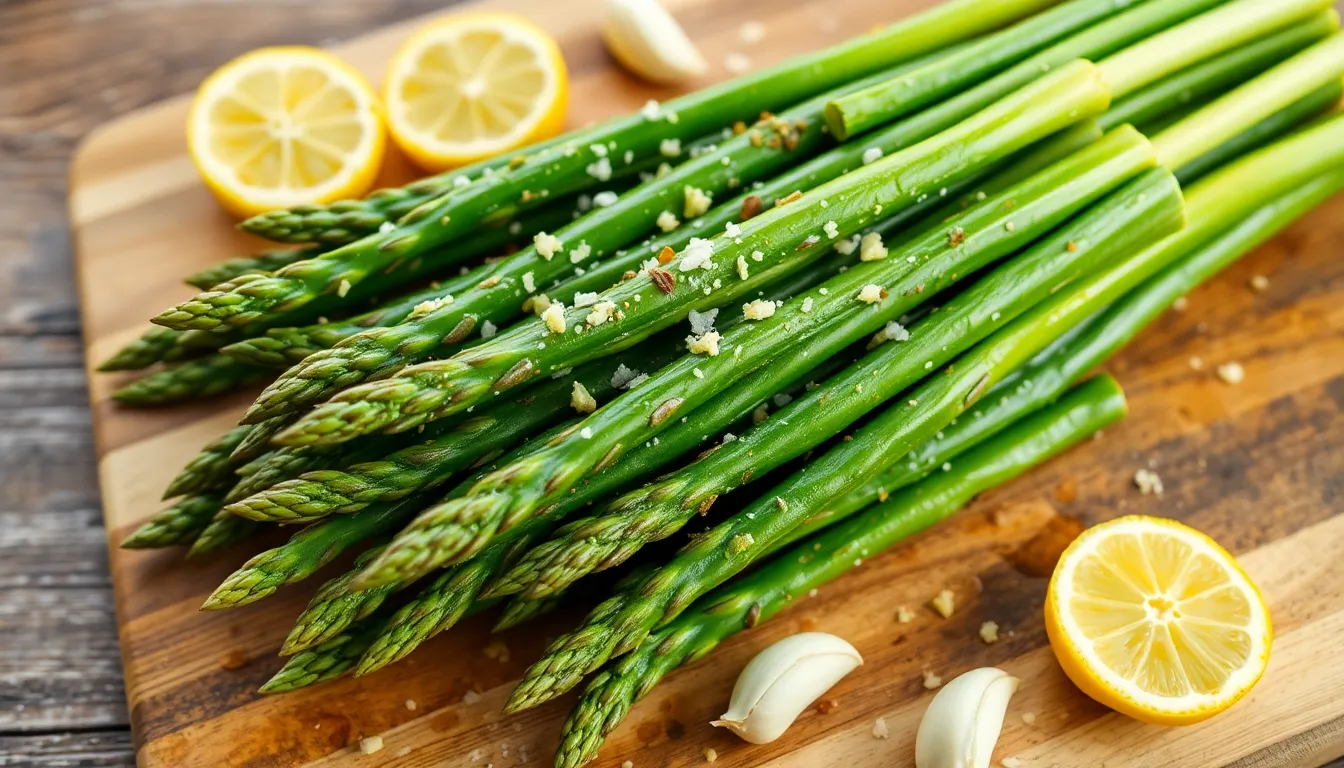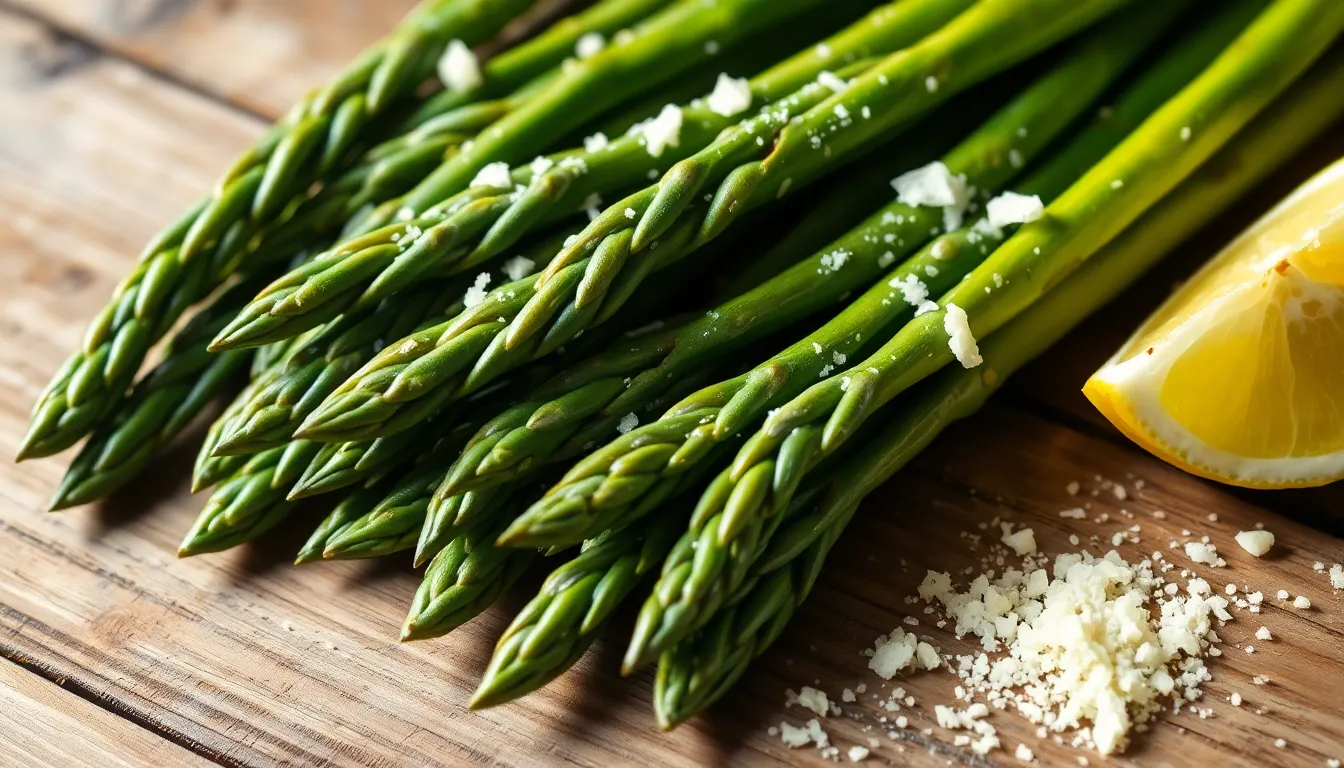Asparagus might seem like the wallflower of the vegetable world, but with the right seasoning, it can steal the show at any dinner table. This vibrant green stalk is not just a pretty face; it’s packed with nutrients and flavor potential waiting to be unlocked. So why settle for bland when you can elevate your asparagus game to gourmet status?
Understanding Asparagus
Asparagus, a vibrant green vegetable, offers a unique culinary experience. This nutrient-dense vegetable features a delicate flavor and a crisp texture. Typically found in two main varieties—green and purple—each type contributes its character to dishes. Green asparagus boasts a slightly grassy taste, while purple asparagus carries a sweeter profile.
Packed with vitamins A, C, E, and K, asparagus supports overall health. Fiber content ensures digestive benefits, making it a wholesome choice. Potassium present in asparagus aids in maintaining proper blood pressure levels. Antioxidants found in this vegetable help combat oxidative stress, adding to its health benefits.
Asparagus thrives in well-drained soil and requires a sunny environment. Harvesting typically occurs from spring to early summer, offering peak flavor during this period. Farmers and gardeners often aim for a slender stalk, which denotes tenderness and freshness. Those who seek the best asparagus consider its size and firmness when selecting it.
Cooking methods greatly impact the flavor and texture of asparagus. Roasting brings out its natural sweetness, while steaming retains its vibrant color. Grilling adds a smoky depth, enhancing any dish. Choosing the right seasoning can elevate asparagus even further, transforming it into a highlight of any meal.
Sourcing asparagus locally can lead to higher quality produce. Locally grown options often provide better flavor compared to imported varieties. Compliance with sustainability practices can also be a consideration for eco-conscious consumers. Embracing the versatility and nutritional richness of asparagus unlocks endless possibilities in the kitchen.
Popular Seasoning Options

Enhancing asparagus with seasonings elevates its natural flavors. Several popular options complement this versatile vegetable.
Salt and Pepper
Salt enhances the flavor of asparagus, making it a foundational seasoning. Using a pinch of salt brightens the vegetable’s taste. Pepper adds a gentle heat, providing contrast to the mildness. Combine both for a simple seasoning that highlights asparagus without overwhelming it. A basic blend of sea salt and freshly ground black pepper offers an excellent seasoning starting point.
Garlic and Onion Powder
Garlic powder introduces a savory component, enriching asparagus dishes. Onion powder contributes a subtle sweetness, balancing the flavor profile. Both powders infuse aromatic qualities, making asparagus more enticing. Sprinkling these seasonings before roasting or sautéing enhances the overall taste. A blend of garlic and onion powder transforms asparagus into a flavorful side dish.
Lemon and Zest
Lemon adds brightness, enhancing the freshness of asparagus. A squeeze of lemon juice complements the vegetable’s earthiness. Zest provides aromatic oils, intensifying the citrus flavor. Using both juice and zest creates a well-rounded seasoning. This bright combination works particularly well in grilled or steamed asparagus recipes.
Unique Flavor Combinations
Asparagus offers a canvas for various unique flavor combinations that enhance its natural taste. Exploring different seasonings elevates this vegetable, making it suitable for any dish.
Balsamic Vinegar
Balsamic vinegar complements asparagus with its sweet and tangy profile. Drizzling it over roasted asparagus adds depth and complexity. The acidity cuts through the vegetable’s earthiness, creating a balanced bite. Vinegar’s rich flavor pairs well with grilled or sautéed asparagus for a vibrant side dish. Consider mixing balsamic vinegar with olive oil for a simple dressing that enhances both flavor and texture.
Parmesan and Herbs
Parmesan cheese brings a nutty, salty edge to asparagus, enhancing its flavor. Grating fresh Parmesan over steamed or roasted asparagus creates a delicious coating. Complement this with fresh herbs like thyme or basil for an aromatic touch. These herbs infuse the dish with additional layers, making it more appealing. Combining Parmesan with lemon zest amplifies the freshness, offering a delightful contrast to the savory notes.
Tips for Seasoning Asparagus
Seasoning asparagus effectively enhances its natural flavor while offering versatility. Various tips help highlight the vegetable’s unique qualities, ensuring a delightful culinary experience.
Timing and Cooking Methods
Proper timing is crucial for seasoning asparagus. Overcooking can lead to mushiness, diminishing taste. Roasting, grilling, or steaming for three to five minutes maintains crunchiness, allowing seasonings to penetrate. Applying seasonings before cooking ensures they infuse flavors as asparagus cooks. For instance, tossing asparagus with olive oil, salt, and pepper before roasting creates a delicious crust. Ending with a splash of lemon juice post-cooking adds brightness. Experimentation with cooking methods, such as blanching followed by grilling, also offers opportunities to season with different ingredients.
Balancing Flavors
Achieving flavor balance is essential in seasoning asparagus. Consider combining salty, sweet, and acidic elements for depth. Pairing asparagus with garlic powder complements its natural taste without overpowering. Balsamic vinegar introduces a tangy sweetness that brightens dishes. Fresh herbs like thyme or dill enhance aroma while adding earthy notes. Ensuring the right ratios is vital; overly sweet or salty additions can overshadow asparagus. Testing various combinations creates an exciting array of flavor profiles.
Asparagus deserves a spot in every kitchen due to its versatility and rich flavor. By experimenting with various seasonings and cooking methods, anyone can transform this nutrient-packed vegetable into a standout dish.
Whether opting for the classic combination of salt and pepper or exploring bold flavors like balsamic vinegar and Parmesan cheese, the possibilities are endless. Fresh herbs can elevate its taste while maintaining its natural appeal.
With a little creativity and attention to detail, asparagus can go from a simple side to a gourmet delight, making it a favorite for any meal. Embracing these seasoning tips will not only enhance the dining experience but also celebrate the unique qualities of this remarkable vegetable.













